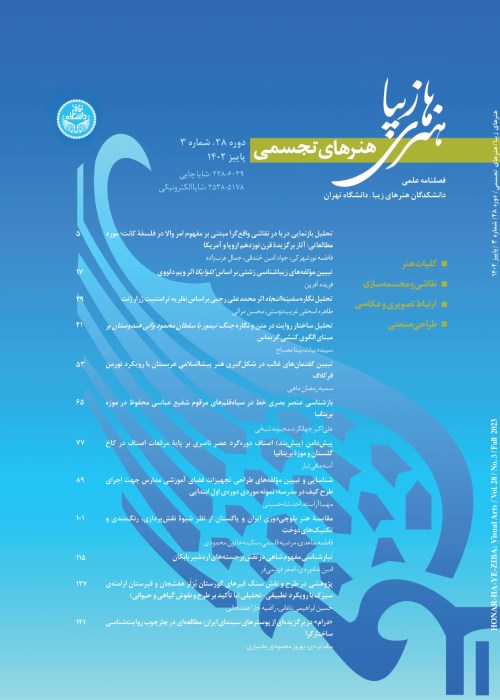A Historical and Functional Study of the Significant Lighting Products of the Bauhaus
Author(s):
Article Type:
Research/Original Article (دارای رتبه معتبر)
Abstract:
The Bauhaus was one of the most prominent architecture schools and applied arts of Germany from 1919 to 1933. During those years this School located in three German cities, respectively; Weimar, Dessau, and Berlin. The Bauhaus had always shown particular attention to industrial design and was active in the field of furniture design, lighting, packaging, exhibition stands and outdoor advertising. Among all, lighting products had a special position in the Bauhaus School. The specific focus of the Bauhaus on the lighting design mainly was due to the presence of the enthusiastic designers such as László Moholy-Nagy and Marianne Brandt stimulating hard work on this edge. László Moholy-Nagy with his activity in light-space modulator as well as his studies on light and shadow, photogram also his visions on managing metal workshop in the Bauhaus brought an applicable view on this field. Moreover, the works of Marianne Brandt as the most important lighting designer of the Bauhaus that made contracts with industry caused development in the lighting design in the Bauhaus School. Additionally, revenue came from selling mass production in the market made the highest motivation to the Bauhaus focusing the lighting issue. The Bauhaus motto was unifying art and industry. The Bauhauss products found their way to the market as they were far more progressed than their time. Even now many reputable companies reproduce and sell the same lighting products.
In This article, the core functionality at industrial design will be studied with looking close at the significant lighting products of the Bauhaus. In this regard, some issues connected to the field of lighting in the Bauhaus school such as the lighting position at the Bauhaus, some significant samples of the Bauhaus lighting products, their application in the interior design, the designers of these products and the Bauhaus metal workshop in which many designs shaped into a product, have been studied in detail. Afterward, the three focal tasks, including functions of functional industrial design, aesthetic and symbolic in general have been reviewed in those products. Four samples pendant lamps, floor, desk and walls light have been shown in the table. In functional operation, the Bauhaus lighting products have been designed in accordance with the vision of form follows function. In other words, the lightings are just composed of main parts without extra details. Concerning the functions of the aesthetic, form of these products have features such as basic geometric shapes with primary colors also most of the time they are made of metal and glass. Also, these lights follow the rules of visual balance, rhythm, and proportional aspects. With reference to the symbolic function of the Bauhaus lights, they have been distinguished by objective influences of the Constructivism and the De Stijl. In the end, a perceptual map of three mentioned different function has been drowned for all eleven selected samples of the Bauhaus lights. All relevant information and design Specifications of the Bauhaus lightings from last century have been gathered under historical method and the information has been analyzed through descriptive and analytical approach.
In This article, the core functionality at industrial design will be studied with looking close at the significant lighting products of the Bauhaus. In this regard, some issues connected to the field of lighting in the Bauhaus school such as the lighting position at the Bauhaus, some significant samples of the Bauhaus lighting products, their application in the interior design, the designers of these products and the Bauhaus metal workshop in which many designs shaped into a product, have been studied in detail. Afterward, the three focal tasks, including functions of functional industrial design, aesthetic and symbolic in general have been reviewed in those products. Four samples pendant lamps, floor, desk and walls light have been shown in the table. In functional operation, the Bauhaus lighting products have been designed in accordance with the vision of form follows function. In other words, the lightings are just composed of main parts without extra details. Concerning the functions of the aesthetic, form of these products have features such as basic geometric shapes with primary colors also most of the time they are made of metal and glass. Also, these lights follow the rules of visual balance, rhythm, and proportional aspects. With reference to the symbolic function of the Bauhaus lights, they have been distinguished by objective influences of the Constructivism and the De Stijl. In the end, a perceptual map of three mentioned different function has been drowned for all eleven selected samples of the Bauhaus lights. All relevant information and design Specifications of the Bauhaus lightings from last century have been gathered under historical method and the information has been analyzed through descriptive and analytical approach.
Keywords:
Language:
Persian
Published:
Journal of Fine Arts, Volume:23 Issue: 1, 2018
Pages:
103 to 114
magiran.com/p1812710
دانلود و مطالعه متن این مقاله با یکی از روشهای زیر امکان پذیر است:
اشتراک شخصی
با عضویت و پرداخت آنلاین حق اشتراک یکساله به مبلغ 1,390,000ريال میتوانید 70 عنوان مطلب دانلود کنید!
اشتراک سازمانی
به کتابخانه دانشگاه یا محل کار خود پیشنهاد کنید تا اشتراک سازمانی این پایگاه را برای دسترسی نامحدود همه کاربران به متن مطالب تهیه نمایند!
توجه!
- حق عضویت دریافتی صرف حمایت از نشریات عضو و نگهداری، تکمیل و توسعه مگیران میشود.
- پرداخت حق اشتراک و دانلود مقالات اجازه بازنشر آن در سایر رسانههای چاپی و دیجیتال را به کاربر نمیدهد.
In order to view content subscription is required
Personal subscription
Subscribe magiran.com for 70 € euros via PayPal and download 70 articles during a year.
Organization subscription
Please contact us to subscribe your university or library for unlimited access!



